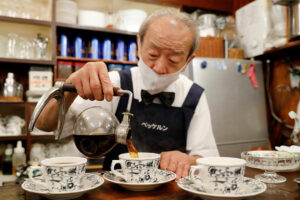THE PHILIPPINES is hoping to expand its share of the Japanese coffee market following the introduction of specialty coffee varieties to potential large-scale buyers, the Department of Trade and Industry (DTI) said.
In a statement on Monday, the DTI confirmed Japanese interest in Philippine specialty coffee, following a report from Japan-based Commercial Counselor Dita Angara-Mathay regarding three promotional events staged between June 10 and 14, including a coffee tasting.
“The (coffee tasting) event opened up much interest in Filipino coffee among those in the Japanese coffee industry. There are now talks between Japanese importers and Philippine coffee exporters for trial orders ranging from 1,000 kilos of green beans to 25 kilos of roasted specialty beans. If the trial orders go well, the importers committed to have repeat orders in larger amounts,” the DTI said.
According to the DTI, the coffee tasting event was attended by 41 industry participants, including coffee chain operator UCC, roaster Doutor, food company AGF Ajinomoto; importers Marubeni Foods, Sojitz, Aoyama Tsusho and CocoCures; retailer Don Quijote; and other specialty coffee companies like Horiguchi, Cerrad, Mobius, Tailwinds and Woodberry.
The specialty coffee beans were provided by VerraCoffee, a social enterprise currently exporting coffee to Filipino entrepreneurs in Australia, New Zealand, Malaysia, and the US.
Ms. Mathay said that the DTI is pushing Barako coffee from Southern Luzon, Peaberry Coffee from the Cordillera highlands, and Davao del Sur Peaberry from Mount Apo in Mindanao.
“These are rare and exotic coffee beans that we hope will satisfy the discriminating tastes of coffee drinkers on the lookout for specialty coffee. We want to push it in Japan, Asia’s largest coffee market, as a niche gourmet product. We are confident a few Japanese coffee shops will feature it among their small-lot coffee lines,” Ms. Mathay said.
The DTI said Barako coffee, also known as Philippine Liberica, is considered rare, accounting for 2% of global coffee production.
“Very few people are aware that the Philippines was one of the top producers of coffee in the world in the 1880s. Fast forward to today, opportunities abound in the rising wave of coffee consumption and increasing number of people who actively search and prepare specialty coffee in their homes or pursue it as a business,” the DTI said. — Revin Mikhael D. Ochave
